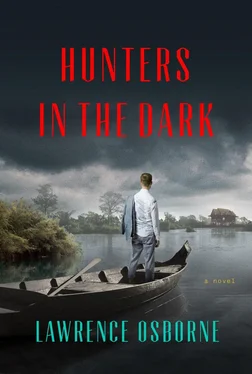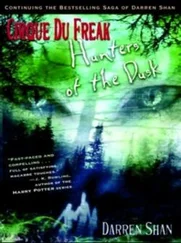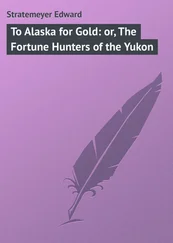“There are many ghosts along the river, hombre. Quite a few. I don’t see them but she does. She has a knack of seeing them. I used to say, Oh, it’s a Khmer thing, and it was a bit patronizing, but now I wonder. I wonder if she’s just got a flair for it. A nose.”
Along that river a longtail now moved, a lamp hung from its rear end, the motor purring quietly. They got a little drunk. The girl went back upstairs and Robert lost the game and they sat for a while under the careering moths and the oil lamp hung on a black wire.
“I suppose you’ll leave tomorrow,” Simon said. “My boatman can drop you off in the city and just tip him a twenty if that’s all right.”
“I’m grateful — it seems cheap.”
“It’s not cheap at all. But if you think it is, that’s great. I might even come with you, though I think we have things to do up here tomorrow. Meanwhile, I have a bit of red opium left over from last night. Shall we smoke it and be hippies?”
“Let’s.”
—
As they lit the pipe Robert felt ants crawling across his naked feet, things crawling between his toes, and he didn’t mind. The air had suddenly become deliciously cool and the heat and bustle of the day had receded even mentally. So this was what it was like here. The days pinned you down in stress, sweat and misery and then the nights came along to rescue you and set you back on your feet. Nights were the key to survival, the way out of the stultifying labyrinths of the days. Without the nights humans would shrivel up like cockroaches and die. Simon won the game and they began another, and as they did so they puffed at the pipe, which Simon had prepared with delicate dexterity. It tasted sweet, like stewed plums, and the smoke passed easily into Robert’s lungs and out again into the air.
“It’s tasty” was all he could say. “I’ve never—”
“It’s hard to get these days. It became an unfashionable addiction at some point. I can’t imagine why. It’s so mild and pleasant.”
“It’s like something for children.”
“In a way, yes…”
Robert began thinking about the boat the next day.
“Maybe I should go early,” he said. “That’s what everyone recommends here, isn’t it? Get up early and avoid the heat.”
“Generally that’s what we do. Shall I call him now?”
Simon made the call and spoke in Khmer.
“Six all right for you?” he called over to Robert.
Robert nodded and so it was decided. He would probably have an opium-and-beer hangover but it didn’t matter.
“Where does the boat go exactly?”
Simon put down the phone and extracted his pleasure from the pipe, which he held with three fingers as if an ancient Chinese man had shown him how to do it properly.
“Where you want. We usually go down to a small town a few miles out of the city and taxi in from there. The piers in Phnom Penh can get way too busy with all the tourist boats.”
“I’ll do that then.”
“You’ll be there for lunch. Do you eat lunch, Robert?”
“I can’t remember. I can’t—”
“I know a place you could go. Right on the river.”
“Yes, on the river.”
Robert felt light-headed. The lights along the far side of the river had begun to seem more spread out and their reflections in the water shimmered more violently. The outlines of the trees had grown more imposing in some way.
“I’ll write it down for you,” Simon went on. “You can go there and eat fish amok. Very nice.”
Simon rose and walked over to the paraffin lamp hanging from the rafters and lowered the flame. He half turned and glanced down at the stoned visitor who had stretched out his legs and sidled onto the entire length of the sofa he was seated on. The music had stopped and it was just the insects now, the sound of the fields. The pipe lay in the center of the table on a dish that seemed to serve that specific purpose, its wisp of smoke perfectly vertical. A life of casual idleness was expressed in that single upright line of smoke and it was a life which, looking at it, Robert suddenly wanted for himself, even though he was repelled by its uselessness. It couldn’t be that hard to attain. He thought: I am in some kind of fairy tale and nothing can be that hard to attain. All I have to do is wish for it on a star. Simon came back to his own sofa, fell into it and restocked the pipe so the smoking of it could go on. He lit it up again and passed it at once to his guest. The conversation between them had now run dry, but without awkwardness. Like a stream that peters out at its appointed place and time, without drama. It no longer mattered. It is always the way when conversation no longer matters. It dies its natural death with a quiet submission to fate. Robert felt himself falling backward into the rough fabric of the sofa while the ants ate his feet alive. He thought to reach down and scratch the skin or crush the ants but when he raised his hand to do so he found that he could not.
“You can sleep down here,” Simon said at last, and his words came to Robert like something whispered at the far end of a long tunnel.
Robert rolled slowly onto his back and his mind let go of the unfinished chess game and the ants. He stared up at one of the shiny black fans. The mosquitoes were audible, their beating wings as loud as rotary blades. Out in the darkened rows of sugarcane the rabbits nibbled at the edge of the covering shadow, their eyes shining for a moment as they turned and listened to birds of prey. He placed a hand over his eyes and felt his mouth go dry. He remembered the bats which Ouksa had roused earlier that day, their wings beating just like the insects now. What world, then, did they inhabit?
He came over the Downs in the tall grass and the flint walls of the old barn stood high on the crest almost with a view of the sea through a gap in the hills. There were large holes in the walls filled to bursting with stinging nettles and through these a small boy could step. Inside it was gloom and fragrance but he always hesitated because he was alone. Around the barn the grass quivered and rippled and there were momentary patterns upon its silvery surface. He reached out and ran his hand along the rough flints and he drifted through the cornflowers at the bottom of the walls. Why always here, under this same apex sun which made the shadows stand still only a millimeter from the forms that cast them? The terror of the cows standing in their isolate shadows too all over the hillsides, in gleaming rivers of half-dried mud. Look up at the sun and you wake at once, always the same.
He did so then and he saw the blueness of a morning sky, almost the same as the sky of England and childhood. It, and not his eyes, seemed to blink. Then, almost at the same moment, he heard water and sensed it close by. The lapping of lake waves, weak but ploddingly insistent. The horizon tilted, then righted itself: he was on a boat.
It must have been the boat that Simon had called for him. Though his head still hummed from the night before he got onto his elbow and forced his eyes to work again. He was on the deck of a small shabby fishing boat with a motor at its rear end and above him in a ramshackle cockpit a man stood at the wheel smoking a half-crushed cigar. He was naked but for a pair of shorts and dark blue tattoos ran all down his back.
Robert was lying on a mattress, like that of a sunbed, and the early-morning sun had burned his nose a little. Water, he thought. I need a bloody drink. He got up with difficulty and steadied himself and made his way forward to the cockpit. The man turned without surprise and motioned to a thermos lying in the shade. It was hot coffee with sugar and milk.
“Good morning,” Robert said as loudly as he could.
Читать дальше












